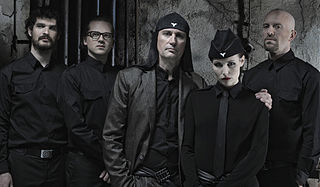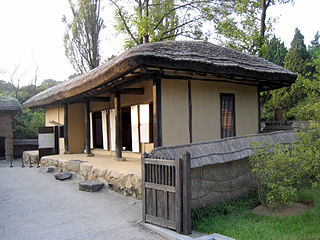
Laibach is a Slovenian and Yugoslav avant-garde music group associated with the industrial, martial, and neo-classical genres. Formed in the mining town of Trbovlje in 1980, Laibach represents the musical wing of the Neue Slowenische Kunst (NSK) collective, a group which Laibach helped found in 1984.

The contemporary culture of North Korea is based on traditional Korean culture, but has developed since the division of Korea in 1945. Juche, officially the Juche idea, is the state ideology of North Korea; It is considered a variation of Marxist-Leninism. Juche displays Korea's cultural distinctiveness as North Korea is the creator and sole adopter of the ideology.
The music of North Korea includes a wide array of folk, popular, light instrumental, political, and classical performers. Beyond patriotic and political music, popular music groups like Pochonbo Electronic Ensemble and Moranbong Band perform songs about everyday life in the DPRK and modern light pop reinterpretations of classic Korean folk music. Music education is widely taught in schools, with President Kim Il Sung first implementing a program of study of musical instruments in 1949 at an orphanage in Mangyongdae. Musical diplomacy also continues to be relevant to the Democratic People's Republic of Korea, with musical and cultural delegations completing concerts in China and France in recent years, and musicians from Western countries and South Korea collaborating on projects in the DPRK.

The Grand Mass Gymnastics and Artistic Performance Arirang, also known as the Arirang Mass Games, or the Arirang Festival is a mass gymnastics and artistic festival held in the Rungrado 1st of May Stadium in Pyongyang, North Korea. The games usually take place in August or September. The Arirang Mass Games were held annually between 2002 and 2013, with the exception of 2006. After a five-year hiatus, Mass Games returned for a performance entitled 'The Glorious Country' in 2018.
The State Symphony Orchestra of the DPRK is a symphonic orchestra in North Korea and the first classical music ensemble to be established there.
The New York Philharmonic concert in Pyongyang, North Korea, on February 26, 2008, was a significant event in North Korea–United States relations. The orchestra played in East Pyongyang Grand Theatre, with the entire concert broadcast on North Korean state television.

Kim Chaek was a North Korean revolutionary, military general, and politician. His birth name was Kim Hong-gye.

Kevin Woo, also known mononymously as Kevin, is a South Korean-American singer-songwriter and television host based as a Korean in New York City. He is primarily known as a former member of South Korean boy band U-KISS from 2008 until 2017, as well as a host of various programs such as After School Club.

Korean revolutionary opera (Korean: 조선혁명가극) is a tradition of revolutionary opera in North Korea inspired by Chinese Revolutionary Opera which blossomed during the Cultural Revolution. It is characterized by a highly melodramatic style and reoccurring themes of patriotism and glorification of Juche, President Kim Il Sung, and the working people, as well as a focus on socialist realist themes. Composers of North Korean revolutionary opera are employed by the North Korean government and the fundamental principles of North Korean revolutionary opera were dictated by Kim Jong Il in his speech On the Art of Opera.

The Moranbong Band, also known as the Moran Hill Orchestra, is a North Korean girl group. The original members were selected by the country's supreme leader, Kim Jong Un. Performing interpretive styles of pop, rock, and fusion, they are the first all-female band from the DPRK, and made their world debut on 6 July 2012. Their varied musical style has been described as symphonic because it is "putting together different kinds of sounds, and ending in a harmonious, pleasing result."

Kim Won-gyun was a North Korean composer and politician. He is considered one of the most prominent, if not the most celebrated, composer of North Korea. He composed "Aegukka" — the national anthem of the country — and "Song of General Kim Il-sung", in addition to revolutionary operas.

Cho Ki-chon was a Russian-born North Korean poet. He is regarded as a national poet and "founding father of North Korean poetry" whose distinct Soviet-influenced style of lyrical epic poetry in the socialist realist genre became an important feature of North Korean literature. He was nicknamed "Korea's Mayakovsky" after the writer whose works had had an influence on him and which implied his breaking from the literature of the old society and his commitment to communist values. Since a remark made by Kim Jong Il on his 2001 visit to Russia, North Korean media has referred to Cho as the "Pushkin of Korea".

Upon its liberation in 1945 and subsequent foundation in 1948, North Korea adopted national symbols distinct from the national symbols of South Korea. The traditional flag of Korea, the Taegukgi, and the symbol Taeguk, were swapped for socialist symbols.
"We Will Go to Mount Paektu" is a 2015 North Korean light music song in praise of the country's leader, Kim Jong Un.
The September 2018 inter-Korean summit was the third and final inter-Korean summit in the 2018-19 Korean peace process.

Revolutionary Sites (Korean: 혁명사적지) are designated historical sites in North Korea. The sites were designated by Kim Jong Il when he began working at the Propaganda and Agitation Department of the Workers' Party of Korea in 1966. He would send troops all over the country to unearth sites that "were supposedly once forgotten and undiscovered". By converting North Korea into a "huge open museum", Kim's goal in designating the sites was to solidify the North Korean cult of personality centered around him and his father Kim Il Sung.
Ponghwa Revolutionary Site is a Revolutionary Site in Kangdong County, Pyongyang in North Korea.
Ri Kyong Suk is a North Korean singer.
Tell O' The Forest! is a North Korean revolutionary genre theatrical performance. First performed in 1972, it is credited to Kim Jong-il.
"Arirang Fantasy", originally titled "Arirang", is a 1976 modern classical composition for orchestra by the North Korean composer Choi Sung-hwan, who died in 1981. It based on the Korean folk song "Arirang", specifically the "Bonjo Arirang" arrangement, which is the most popular and well-known of all the "Arirang" variations, thanks to its popularization in the 1926 film Arirang.











